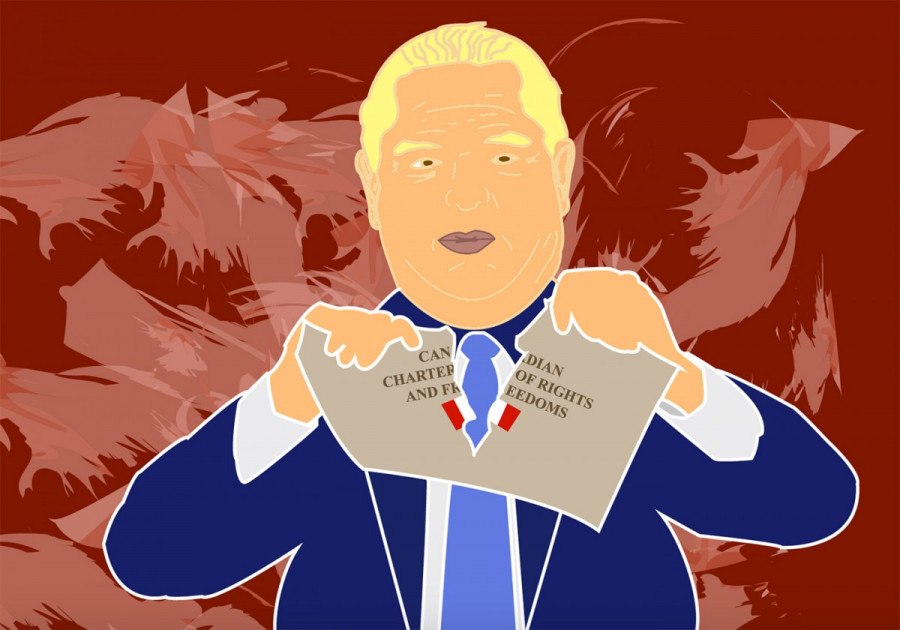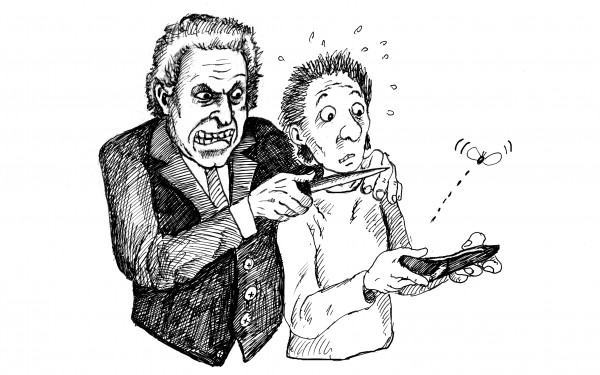How Doug Ford Can Be Above Canadians’ Fundamental Rights
What The Notwithstanding Clause Means for Canadians As a Whole
A historical use of the notwithstanding clause by Ontario’s premier, Doug Ford, is sparking outrage.
The clause allows Ford to bypass a Superior Court Justice ruling. I strongly believe that no politician, even a Premier, should be above the law. Rulings are made for a reason and should be respected.
The notwithstanding clause can be found in section 33 of the Canadian Charter of Rights and Freedom.
The clause allows legislation to override the fundamental rights of Canadians.
A law considered to be illegal by the Canadian Charter can ultimately be adopted. This section shouldn’t even exist, as it gives way too much power to those who use the clause. It is unconstitutional to override rights established over 30 years ago.
Section 33 was added to the Canadian constitution under Pierre Elliot Trudeau’s administration in the 1980s. Since the addition of the clause, many have expressed their disagreement with it.
The clause allows those in higher power to bypass court rulings, rights, and freedoms. It also gives much more power to those in charge. A whole section that can overrule a humans’ freedom goes against the whole point of having a Charter.
Why invoke the clause? The province of Ontario is in the midst of a municipal election. Earlier this summer, the number of Toronto city council members was increased from 44 to 47. In July, Premier of Ontario Doug Ford announced he will cut the number of wards to 25 as part of an Efficient Local Government Act. Ontario Superior Court Justice judge, Edward Belobaba, was against this decision and revoked Ford’s act.
Sept. 10, Doug Ford announced he will apply the notwithstanding clause to override Belobaba’s court ruling. While Ford may be in the right to use the clause in this case, if his plan goes through citizens are less likely to have their voices heard in the council because of the limited number Ford is imposing. The whole point of a democratic regime is to give a voice to the people by letting them choose who represents them and by letting them be sufficiently represented. The small council of 25 wards won’t effectively represent the people of Toronto, with its total population of 2.8 million.
The use of the clause is a first for the province of Ontario. Ford defended his choice during a press conference: his four years amongst the council proved decision-making to be a lengthy process. This problem, according to Ford, could be reduced by cutting the number of members. Faster deliberations can benefit the city. Immediate action will be taken to solve problems and decide on new legislation.
I believe creating a plan of action to adequately take decisions can be as and if not more resourceful than simply cutting down the number of wards. Faster decision making doesn’t guarantee the decisions will be of as high a quality as those made with the opinions and expertise of 47 wards.
Edward Belobaba stands by his initial choice to increase the number of council members. Belobaba explains in a CBC article that the reduced number of members causes an ineffective representation of the people. One councillor will now represent over 100 000 citizens. Toronto’s citizens’ needs and worries will less likely be equally treated among the council. Legislations and decisions established may not represent the pressing needs of citizens.
Ontarians are upset over Fords use of a clause that takes away a person’s fundamental right allowing him to be above all law. Even Justin Trudeau said he is ‘’disappointed by the provincial governments in Ontario’s choice’’ during a press conference on Sept.11.
The use of the clause is unjustified. Judge Belobaba increased the number of councilmen to better represent the population of Toronto. Ford’s concern towards decision-making can be solved through other solutions. For example, creating a protocol to make deliberations more efficient. The use of the notwithstanding clause is the lazy solution to Ford’s problem.
Ford expressed his willingness publicly to invoke the notwithstanding clause again if needed. Many are fearing this may become a default response to him not having his way. Ontario will no longer be a democracy if every fundamental right is overridden by Ford. Reducing a cities representation due to cuts is undemocratic since the goal of the regime is letting the people’s voices be heard and letting them chose who represents them and their city. They are presently being misrepresented by a 25 ward council.
Doug Ford’s use of the notwithstanding clause is not the first of 2018.
The Premier of Saskatchewan invoked the clause to stop Bill 63. Bill 63 allows the government to intervene in parents’ choice of school. Parents expressed their content about the use of the clause. After all, they have earned the right to choose what they believe is best for their child. In this case, the notwithstanding clause is used to benefit citizen. The clause is quite ambiguous since it can allow citizens to have more access to their fundamental rights like in this case or limit them like in Ford’s case.
In Quebec, the leader of the Coalition Avenir Québec, François Legault, has announced he would also invoke the clause to downsize Montreal’s city council. Legault argued 103 councilmen in comparison with Toronto’s 47 members is “a lot.’’ Reasonable, since Montreal’s population is 1.7 million; one million less than Toronto’s 2.8 million. He also implied that compared to Ford’s conduct there would be discussions before using the clause.
In regards to Bill 62, which would forbid workers and citizens to wear clothing obstructing the face, Legault said he ‘’would not hesitate to use the notwithstanding clause.’’ The Bill goes against freedom of expression and religion forbidding veils such as the niqab. Current Premier Philippe Couillard had announced he would not be using the clause on this Bill, however this may change if François Legault is elected this October.
Once again the clause is used to the disadvantage of citizens and to deny their fundamental rights. It is unthinkable that a law like this can pass despite the decisions of a higher power, all without consulting with citizens first. Even if the clause can be used to favor citizens, it can also be used to undermine their freedoms and rights significantly.
Ford’s use of the clause is not being greeted with open arms and continues to be faced with scrutiny. Ontarians have the right to be worried. Doug Ford is not shying away from bypassing court rulings and the Charter of Rights and Freedom even if unnecessary.






